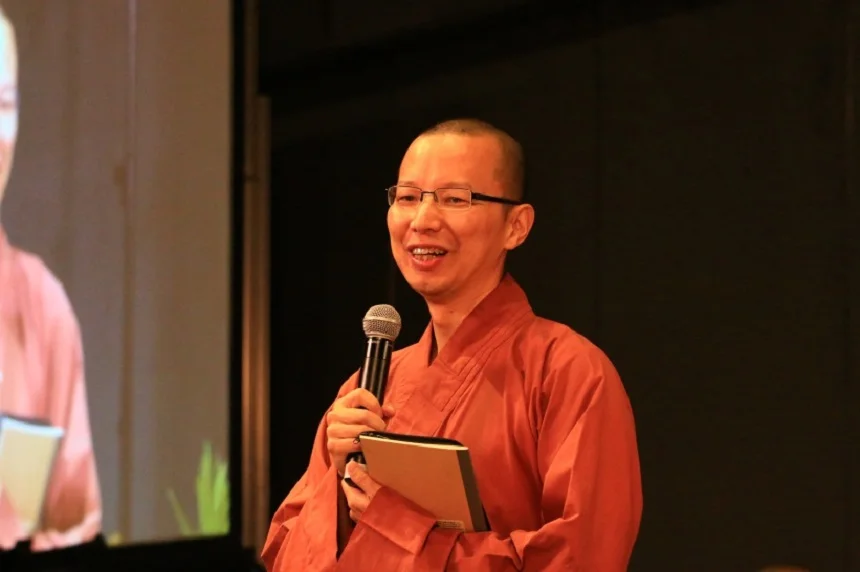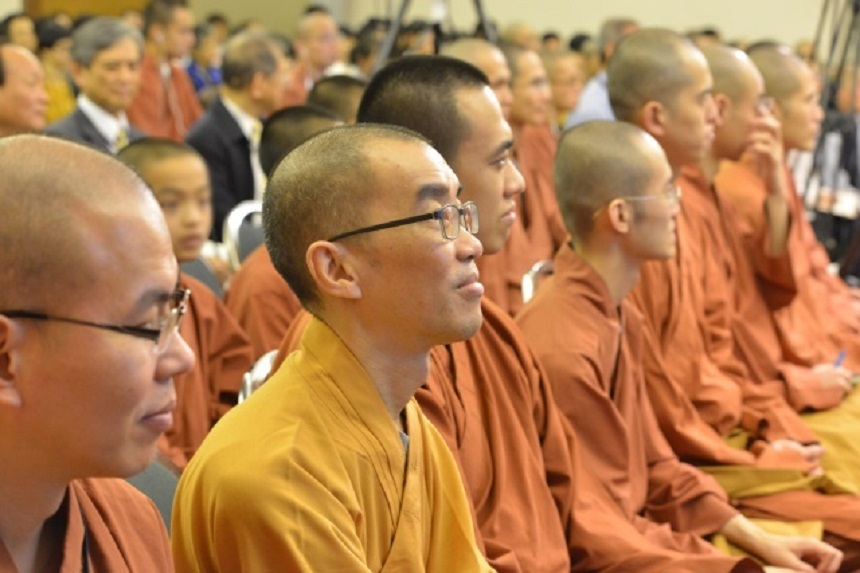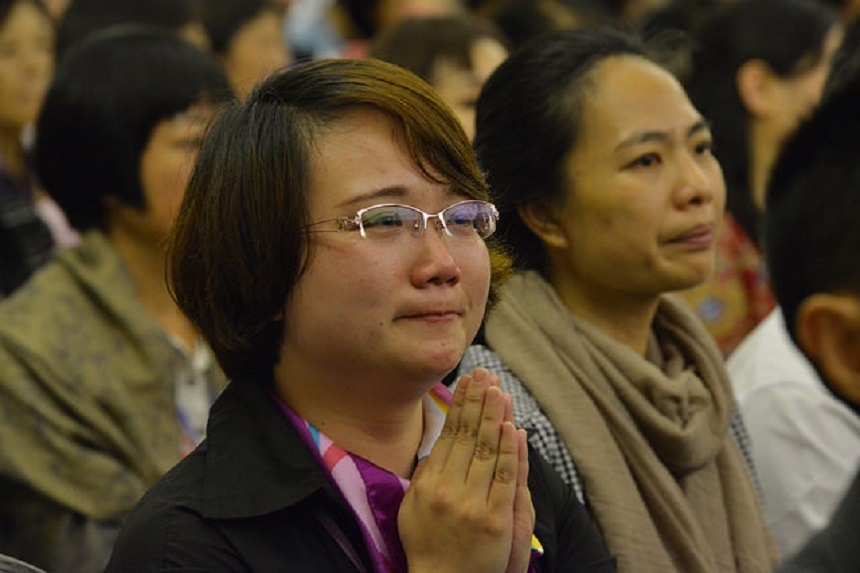Teacher’s teaching on how to eliminate afflictions
Guidance from Venerable Xing Zhe)
Discover the causes of why we still have afflictions when faced with situations
Venerable Xing Zhe led us in the study of Teacher’s teaching on “How to face afflictions”, which was delivered at the Entrepreneur Camp held in Toronto on 3 June 2015. The issue that was raised at the camp was : after learning the Dharma, why do we still have afflictions when faced with situations? Teacher mentioned this was because for aeons, we have been so entrenched in our habits and afflictions that even without encouragement, our mind would be swiftly occupied by these. On the contrary, we are not familiar with mindfulness of the Dharma teachings; it is similar to having a treasured sword but not knowing how to use it, and thus not knowing how to draw it out immediately. Teacher would like us to examine what were the issues that had caused us to ‘topple’ (i.e. come under the control of afflictions), whenever we encountered them in various situations ? What were these issues that had puzzled and troubled us for years? Teacher told us a very important principle : behind any fiery affliction lies a firm belief. This belief’s karmic stream would deceive and prevent us from having the right response and feeling. Therefore, we need to know this in order for us to have the opportunity to block it.
Teacher cited an example of a superior who repeatedly received wrong messages from an employee. Obviously, when faced with such a situation, the usual response would be an outburst of anger against the other person; we would label him/her and might even think that the other person wasted our time. Teacher pointed out that actually the right approach would be to speak to the other person to first find out what difficulties he had, any external and emotional issues and understand his situation. If the relationship had become an impasse with no room for discussion, then if we were the supervisor, we could write down “my” reasoning and apply the principles in the Lamrim – such as the truth of cause and effect, mindfulness of death etc – to examine what we should do as Dharma practitioners in such a scenario; reflect on whether our anger at that moment was because our interest had been compromised orother people’s interest had been compromised. In addition, examine where we would be led to after our “I” had flared up and caused us to create a huge amount of anger and hatred related karma. After comparing every one of our reasoning with the principles of the Lamrim, analyse what was the root cause of our suffering – was it because of our own improper thinking that led us to suffer ? should we take ultimate responsibility for our sufferings?
Apply and practice the methods learnt to become proficient
Venerable said that we were not familiar on how to deal with / overcome our afflictions. When we are faced with the things that we have not learnt before, we do not know how to operate it. Firstly, “learning to know” is important. We feel that we understand and can relate to the principles stated in the Lamrim, but in reality, do we know how to operate these principles? We must practice these again and again till we are familiar and proficient. Under normal circumstances, before situations arise, we have to do the analysis (mentioned by Teacher above) positively, and once the situations arise we will have the ability to withstand it. Also, get connected with the limitless force in the morning – supplicate to our Master and all Virtuous Teachers for blessings and support to go through each day; we need not fight our afflictions alone. Teacher said that when we learned and listened to the Dharma after having discarded our armor and thawed our austerity, each person’s face was like that of a seven or eight years old child receiving protection, purity and serenity. Teacher hoped that everyone could reap the benefits of the Dharma and she was willing to deliver all the light into our hearts. Teacher said that in order to put into practice Master’s teachings and instructions, the very first thing we would have to do was to change ourselves. In doing so, we would surely gain the most benefits. Before we could save others, we “ourselves would have to practice” thoroughly. Teacher encouraged us to become Bodhisattvas! She said, “Masterwishes that we walk the Mahayana path using our human body, which is more precious than gold, to become Bodhisattvas. Therefore do not let it down.” In his summary, Venerableemphasized Teacher’s questions, “Who really am I?”, “What do I want to do?”, “Where is my goal?”, and “What am I here for in this life?”. He hoped that we would reflect on our roles in this life and to establish our life’s objective. Once the objective has been established, then we must have the sincerity to follow through to achieve our objectives.
Summary on how to overcome afflictions
The Venerable summarized the key points and quoted from Master Tsong-kha-pa’s Lamrim, ‘with regard to keeping a pure ethical discipline in this way, Neu-sur-ba said,” Right now, only this internal struggle with the afflictions is important. If you do not struggle with the afflictions, you will not achieve a pure ethical discipline, in which case, you will not attain the concentration and wisdom that, respectively, suppress and uproot the afflictions. Hence, as the Buddha says, you will have to wander continually through cyclic existence.”’ to conclude the learnings for that day. He hoped that everyone would properly learn/practice what had been learnt that day. Most important of all, strive to overcome afflictions. How do we do it?
Firstly, we must observe the situations in which our failings lie and recognize what these situations are.
Secondly, find out the reason behind our outburst. We must break free from the views we hold that lies behind the rise of our afflictions. The Venerable used his role as an attendant to illustrate how he spotted the afflictions of his unquiet mind. When he encountered constant admonishment, his initial thoughts were to humbly accept. However when the rebukes kept coming, he felt that the other party was intent on creating trouble with him. It was under such a situation that the Venerable detected his own afflictions. The Venerable quoted from the Lamrim, ‘An affliction is defined as a phenomenon that, when it arises, is disturbing in character and that, through arising, disturbs the mind-stream’. By looking inward into the afflictions of his own unquiet mind, the Venerable discovered the flaws that he needed to correct within. Thereafter, he became willing to find the correct method to eliminate the flaws.
Thirdly, when we come across one who is lost and disturbed, we should seek first to understand him. Have a good talk with him and help him find out the cause of his problem. It is through helping that enables us to spot the root of the problem. The Venerable stressed that we must practice the above methods before the situation and troubled mental states arise. He advised us to identify the situations and our mental states in writing, to identify what we should do in such situations, and observe what our self-centred views are. Very often, we feel that we do not have afflictions and that we are the victims instead. However when we repeatedly analyse our mind stream, you will discover that it is the grasping to the ‘self’ in action. At the moment when you become aware that you are giving the excuse that you do not have afflictions, you will witness the grasping to the ‘self’ at work while you also recognize the need to change for the better.
Fourthly, we have to compare our mental states as we deal with our afflictions and see if we are progressing by the day. To be able to draw the sword of Dharma in the quickest time to overcome afflictions, we have to depend on our practice when situations have yet to arise, along with supplication to our Teachers.
Venerable encouraged us to practice what Master wishes us to do – When we encounter situations and afflicted mental states arise, give it our greatest priority and put in our wholehearted effort to eradicate the afflictions; such is the practice of the Dharma.
Jan 2016 Spiritual Learning Camp Lesson Summary by: He Ling Ling, Huang Ya Qi
Translation by: Nellie Lim, Chia Mui Eng, Tenzin Quek.
老师开示:如何面对烦恼
找到面对境界依然生起烦恼的因
性者法师带领我们学习老师在2015年6月3号在多伦多CEO营开示的“如何面对烦恼”——学了法为什么在面对境界时还是在烦恼中?老师说因为我们无始劫来对习气、烦恼太熟练,不用策励马上就来了,速度太快地占领我们心灵的阵地,而对佛法的正念相对的就没有那么熟悉,就好像有了宝剑,但不懂得如何使用就无法马上拉得出来。老师要我们检查一下,当自己对境时,有哪些问题是我们一碰到就倒、困扰我们多年的问题是什么,老师告诉我们一个很重要的理路——任何炽盛烦恼的后面都有一个坚固的见解,这种业流会蒙蔽正确的反应和感受,所以要知道才有机会挡得住。
老师举了一个老板面对连续犯了几次提供错误讯息的员工为例,说明遇境的反应通常是爆发嗔心给对方下标签,甚至于会觉得对方在浪费自己的时间。老师指出其实正确的方法是该找他谈一谈,先看他有没有苦衷,生理及心理上有没有问题,了解一下他的状况;如果两人的关系已经很僵、没法谈时,就要把“我的”道理写下来,再用广论的理路——如因果道理、念死无常等——来看看我们修行人在这件事上该怎样去做,思维当下的嗔心是因为我的利益被伤害,还是大众的利益被伤害。检查是“我”发作后,造作的一大堆的嗔恨业将带我们去哪里?一一作比对之后,是因为非理作意让我们感到痛苦,还是自己该为这个痛苦负起根本的责任,把根本原因找出来。
将学习到的方法加以熟练
法师说对治烦恼是我们不熟悉的,所以当我们面对一样没有学过的东西都不知道怎样去操作,首先“学习知道”很重要,感觉上广论的道理好像耳熟能详、我们都懂,但实际上是怎么操作的?得一次再一次地熟练它,要在平常境界还没现起时就正面剖析,一旦来时才忍得住;还有在早晨时就要跟无限力量连上线,祈求师父善知识加持下度过每一天,不是自己孤孤单单对治烦恼。
老师形容当我们脱掉盔甲、融掉冰霜来学习听闻佛法,每个人的脸上就好像七八岁的小孩,得到守护、净化与宁静。老师期许大家都受用佛法,他愿意把光都送入我们的心里。老师说为了实践师父的教诲,最先要改变的是我们自己,收获最大的也必定是我们自己;而在救他方面,也要靠彻底地“修行自己”才可以成办,老师鼓励大家说:“你们都成为菩萨吧!!!师父希望我们走上大乘这条路,用比金子还要珍贵的人身可以成为菩萨的,不要把它给辜负了。”法师结示时也强调老师的提问: “我到底是谁?”、“我想做什么?”、“我的目标在哪里?”、“我这一生来做什么?”,希望大家思考我们人生扮演的角色及该建立怎样的人生宗旨,宗旨一旦确立后就要有服务宗旨的虔诚。
总结如何斗烦恼的方法
法师总结重点,引用了宗大师在广论中士道所说“如是戒净,又如内邬苏巴云:”现在于内与烦恼斗,唯此为要,不斗烦恼戒不能净。若尔不生伏断烦恼,定学慧学,当须毕竟漂流生死。’”来总结今天的学习,希望我们好好学习这一讲。其中 ——“唯”斗烦恼为要,怎么做?第一点就是要观察,观察我在哪一些事上失败、掉下去,知道“它”是什么。第二就是找出造成我爆发的背后的原因。我们要把自己从导致烦恼的背后的见解中跳脱出来。法师就以自己担任侍者为例来说明自己是如何看见 “心不寂静”烦恼相。当时对于对方的种种指正,从最初的虚心受教及到后来因为指正次数多时就觉得对方是存心在找自己麻烦,透由对境察觉到内心的烦恼相。法师引广论中正明烦恼的“若有法生,即便生起极不静相,由彼生故令心相续,极不静起,是烦恼相。”来观照自己的心不寂静的烦恼相,从中找到了自己要改进的地方,才愿意去找正确的方法来断除它。
第三、看到一个迷惘的人,我们该先去理解对方,找对方谈谈,帮他找出理由,帮他也才能帮助自己看到问题所在。法师强调以上的这些方法,都是要在境界未现起的时候去练习,把它一条一条写下来,看一看这件事该怎么做,看一看以我为中心的见解是什么。很多时候我们认为我没有烦恼、是受害者,当经过一次又一次的剖析,你会发现是“我爱执”在作祟,这时再找借口说我没有烦恼,就会在看到“我爱执”的同时也看到我要改变。第四、对境要靠比对,在我们对治烦恼时,是否一天比一天进步,能做到正法的剑拔出来越来越快,是要靠没境界之外去练习和靠对师长的祈求才得以成长的。
法师勉励我们可以做到师父所期许的——境界来的时候以对治烦恼为重要核心,全力以赴,用全部精神去实践佛法。
2016年1月心灵学习营课程内容整理:何凌凌、黄雅琦





